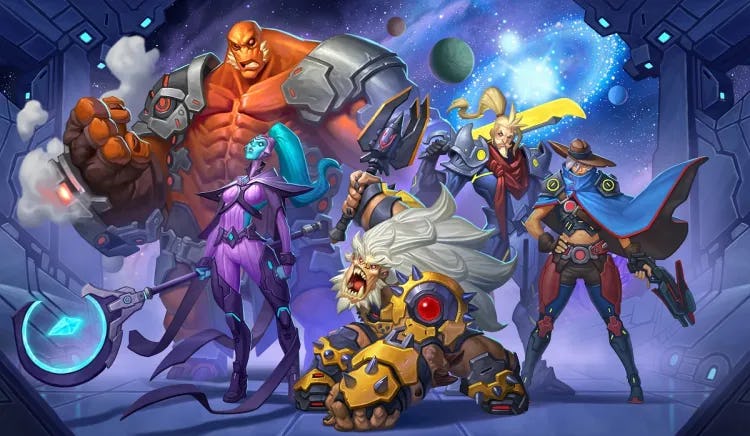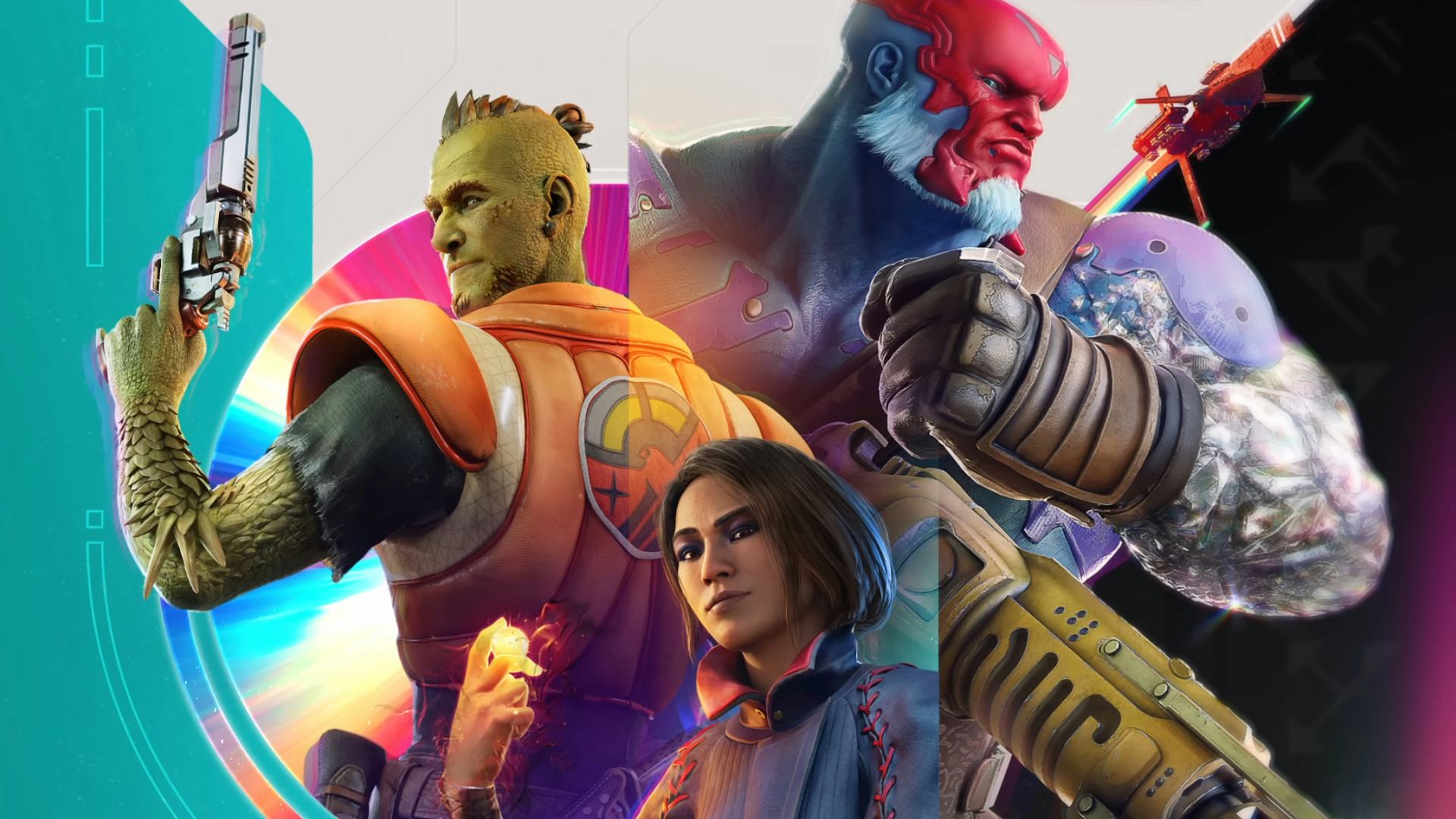
Like any video game developer, Popularium wants to make the next big hit players can’t put down. To get there, the company started, naturally, with a dream team of talent. There’s co-founder Richard Garfield, the creator of Magic: The Gathering and “a voracious video game player.” Next to him is Arka Ray, a former computer scientist and architect of Xbox Live; Jonathan Bankard, a veteran game developer who’s worked on hits like Hearthstone, Diablo, World Of Warcraft, and Command And Conquer; and the tenured game designer Skaff Elias.
People in place, Popularium is next counting on having a debut game that stands out in a world of copycat shooters, open-world adventures, and RPGs. Chaos Agents will be a multiplayer-focused auto-battler that puts players in a Nick Fury-like role, recruiting and assembling a team of globally unique superpowered agents in this ever-evolving science-fiction universe. It’s Vampire Survivors meets Hearthstone: Battlegrounds meets City Of Heroes, except every player has a part in molding this world with each new battle, decision, and accomplished objective.
“You own a copy of the game to the extent that you used to own a disc that you could go and buy.”
“Because they're unique, you end up with this world where every single agent in the way they’re played, and how well they do in tournaments, and how much you engage in the community,” Bankard says. This “offers opportunities for those agents to become part of the narrative of the game.” Sounds promising — and something we’ll report back on once we get our hands dirty in the Alpha.
Chaos Agents is currently in Alpha and you can sign up here to join in. A public beta will release later this year.

This leads to the third value proposition that could make Chaos Agents an immediate and one-of-a-kind stand-out: its ownership model. Popularium has focused on a technological fix that would allow for every aspect of the game, from its unique heroes to the copy of the game downloaded, to belong to the player who buys into this live service indefinitely.
“You own a copy of the game to the extent that you used to own a disc that you could go and buy,” Ray says. “The goal from day one was to build Chaos Agents in a way where we could essentially promise our players that regardless of whether we are around, we are supporting the official servers or not, you will be able to play the game.”
It’s not just refreshing to hear a new developer thinking first and foremost about user ownership — it’s majorly out of step with industry trends. In a world where more big debuts are going straight online and more players fear the plug may be pulled one day, any day from their favorite games, to talk about ownership on day one is music to a gamer’s ears. It is, of course, complicated. Here’s how this startup hopes to pull it off.
Why Popularium Is Betting On Ownership

To get a sense of the simmering battle over gaming ownership, the past year paints a perfect picture. Helldivers, the massively popular sci-fi co-op shooter announced that PC players would lose access to a game they already purchased if they weren’t willing to sign up for a PlayStation Plus account. Thanks to an immediate, coordinated, and destructive fan backlash, PlayStation quickly walked back the requirement. It showed that such a drastic change in terms of service is a concern on gamers’ minds. If a corporation can require you to sign up for an account, what’s stopping it from pulling the game from you entirely?
That question was brought to the fore just a month before when Ubisoft pulled the 2014 racing game The Crew from its lineup. Because of its heavy reliance on online features, the publisher made it completely unplayable. You may have paid $60+ for it 10 years ago or you may have made a few microtransactions to upgrade your vehicles. But all of that investment was now meaningless. Concord, the live service commercial flop published by PlayStation, ceased to exist barely two weeks after its launch due to poor sales. Rather than bring it back as a free-to-play game for players to discover in time, Sony pulled the plug permanently and shut down the studio that made it.
Gamers are feeling squeezed out as more blockbuster games are, perplexingly, ditching the promise of ensuring their content is accessible forever.
“Could my favorite driving game, shooter, or RPG, be next?” is a common question people are asking themselves more and more before dropping big bucks on online-only games. Gamers are feeling squeezed out as more blockbuster games are, perplexingly, ditching the promise of ensuring their content is accessible forever. The fact that factors out of players’ control can render their new favorite game useless puts further pause on buying a copy. In five years, will anyone care to keep the lights on? Popularium has noticed this trend and wants to stay one step ahead by moving in the opposite direction.

Not Another Blockchain Video Game
Popularium runs Chaos Agents through a trio of servers keeping track of the game’s moving parts. When players log in, there’s first a dedicated server farm managed by Popularium handling most of the heavy computations for the game. Players also have a copy running on an application they have downloaded to their device. The two servers run in sync.
If this doesn’t sound like anything new that’s because this was once standard for multiplayer games — until managed networking services like PSN and Xbox Live replaced them, often forcing even PC players to their big networks. Today, you can still find dedicated networks for big franchise like Call of Duty and in the PC space — hat tip to Minecraft, Valheim, and V Rising, for example — but it’s all but gone for most lower-profile games.
“We hope to create a small but meaningful example of a multiplayer live-service game built around the commitment of players able to enjoy it as long as they want to.”
Then there’s the issue of the customized characters and downloadable content. For this, Chaos Agents plans to add a third, separate server which they call the Chaos Vault Application to independently track all trades, player items and inventories, economy, records, and licenses for unique items. Running the Chaos Vault as a separate application allows players to access and manage their teams without booting up the game or checking in with servers. Players can even download a copy of their personalized vault so they can access it offline indefinitely.
“Chaos Agents’ servers use tech similar in design to peer-to-peer file-sharing networks like Napster or BitTorrent to sync Chaos Vaults among Dedicated Server and clients and to enable licenses for their unique Agents and other items to be verified,” says Arka, who also claims that “no other multiplayer-only game offers similar functionality where players can manage their in-game items without connecting to the game’s official servers.”
The game processes all back-end computations using a proprietary technology called the Chaos Cloud Engine, which is entirely open source. In the event Chaos Agents is removed from storefronts like Steam, players could theoretically ensure the game lives on by running servers themselves.
It may seem a bit impractical, sure — not many have access to servers or know how to rent them out themselves — but if the company goes belly up or pulls the plug on it to save a few bucks, dedicated players could pool resources and keep the game running with or without the publisher’s involvement. And thanks to the Chaos Vault, a record of a player’s stats and items can be preserved indefinitely.
“I have witnessed, first-hand, as services that I helped build shut down, taking with them thousands of dollars and hundreds of thousands of hours invested by players in those games and services,” Arka says. “With Chaos Agents, we hope to create a small but meaningful example of a multiplayer live-service game built around the commitment of players able to enjoy it as long as they want to — if a small indie studio like Popularium can make this commitment so can every AAA game publisher.”
Games That Get Better With Time
The biggest upside of creating a game that can ostensibly last forever isn’t just that it won’t disappear but that it can continue to improve and evolve. Garfield compares the concept to a beloved song you keep coming back to over the years, or to his most famous creation, Magic: The Gathering, which has existed for over three decades.
“One of my favorite characteristics of many games is that they get better and better with time,” Garfield says. “It's similar to music, where you listen to the same piece for your entire life, it might change its meaning, but it's not getting worse. It’s the same with good games. Having those playable experiences taken away seems to work against the very essence of gaming.”
It’s a feat of user-friendliness and engineering that creates the infrastructure of a truly living, breathing game that can theoretically go on forever. When every hero is unique in appearance, powerset, movement type, and so on, the result is a pantheon of living myths and legends — a game world where powerful rogues, famous warriors, and unlikely heroes can rise through the ranks, gain notoriety, and create legends recognized by the players. This player-driven storytelling is what Popularium hopes will feed into the open-ended continuity of the Chaos Agents lore, one where players can and will leave their marks permanently and know that it will matter in the long run.
“Many games ... get better and better with time. It's similar to music, where you listen to the same piece for your entire life, it might change its meaning, but it's not getting worse.”
“We want players to be able to trade [characters and items], sell them, and store them indefinitely. The sort of things you would do with a deck of cards,” Garfield says. “I look forward to Agents that are regarded as being not very useful, trading hands and suddenly going up the ladders and winning the world championship. I want to see gems in the rough everywhere.”
The owner and CEO of Bustle Digital Group, Inverse’s parent company, is a tester and investor in Chaos Agents.







